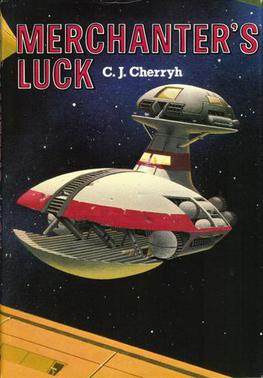14 June, 2016
Merchanter's Luck by CJ Cherryh
1. This short, 208 page novel resembles none of the other three Cherryh novels that I have read so far—Downbelow Station, Cyteen, and Regenesis—but it also sort of does resemble them.
—This is an adventure novel. It’s a straightforward narrative with rising tension and a resolution after the crisis. It’s almost pulp fiction and can certainly be read and enjoyed as such. However, being Cherryh, it still delves deeply into the psychology of Sandor and Allison. They’re both merchanters, the smallest and biggest sort, respectively. Sandor has lost his family and is alone on his ship, going crazy in the blackness of space from: the stress of no job prospects, mounting debt, less and less friendly places being open to him, the constant threat of pirates or Mazianni, his past haunting him, and, most of all, simple loneliness and paranoia—some of which is justified throughout the novel. Allison is under different stresses: overcrowding, lack of advancement opportunities, self-doubt through knowing she is untested, and routine boredom. Cherryh focuses on the most applicable psychological stresses: loneliness and self-doubt. That psychological focus and discussion matches the amount of adventure in here, making the whole as literary as it is all tied into that pulp plot and pacing.
—No intro-info-dump accosts the reader’s first lines. And this absence makes me really happy because I was worried that all of Cherryh’s books would feature that oh so awkward of openings. But here, she fills in the backstories of the main and minor characters skillfully throughout the novel—taking moments when they are alone with their thoughts to reflect on how their situation now differs from their past lives. For instance, the whole story of Sandor/Ed’s dead family is not fully revealed until the last chapter, but most of it is revealed early and revisited throughout with additions to the story every time it comes up. It’s a great tactic to show Sandor as a character really well: he keeps reliving the horror of his past, and as it comes up again and again, with more detail each time, the reader is shocked and sympathetic to this character who is actually quite unlikable. He’s understandable, and his reactions are logical from his screwed up base, but I wouldn’t want to hang out with him—until maybe the end, that is.
—In these two ways, and others like them, I see Cherryh as both writing to her strengths and trying new things in this book. It adheres to Cherryh’s typical storytelling, but also deviates from it in a way that provides an appreciable variety. The new things she tries are done well, and the old things too.
2. This is a book of contrasts. Wealth and poverty are paired together in Sandor who owns his own merchantship outright and alone, but has no money to speak of. Skill and inexperience pair in Allison who is trained and practiced in simulations, but untested in reality. The main characters cross the Line between Union and Alliance, and then Alliance and Mazianni. Through these contrasting points, the novel is able to show how some contrasts strengthen the whole, some weaken them, and most do both. This theme feels complex enough to support a longer story than Cherryh chose to tell, but even in this short length she creates some interesting conclusions that got my mind working.
3. The writing here is great. I’ve already praised the storytelling tactic of revisiting Sandor’s family’s death—a tactic engrossing to both Sandor and the reader. But I think it works so well because the writing is a retelling where each retelling adds details and wrinkles the repetition to make the whole story more and more horrifying. It echoes itself throughout the novel and it’s a relief when the resolution hints that Sandor can start a new family. I like repetition in poetry—Yeats does it so well—and this is repetition in prose done right. It’s not a direct repetition, but a re-explanation, like when a teacher restates something the students don’t understand at first. I fully intend to steal this writing.
4. One thing I didn’t enjoy is the stupendous achievement Sandor makes in time from Viking to Pell. After it’s done, Cherryh explains how impressive a feat it is. But before that, I didn’t understand how impressive. Cherryh could have done more to explain during the journey what is so unusual about the action: but with the worldbuilding not setting the stage appropriately and her voice, that tight third person narrative (explained in point three of my notes on Regenesis), she is backed into a corner here because Sandor is tranquilized during the speed run, so he isn’t quite able to make sense to the reader. We also have not yet seen a normal journey of this length, so it’s unclear what makes this one unusual until it's over. I thought maybe this was how all journeys went when a ship had a solo crewmember. She does a good job of explaining it later, especially with the journalists' and Reillys' responses, but some more foreshadowing would’ve helped here.
5. However, Cherryh's use of her voice is not a mistake in the rest of the novel. For instance, when Sandor is on the dock at the start, there isn't that much description given because he isn't thinking about it—at least not until he chases Allison into an unfamiliar, expensive bar the likes of which he has never seen. But then, when he gets back on his ship, the intricate way that Sandor is shown thinking about his ship both describes it and communicates his utter love for it. Sandor's ship is a big part of the whole novel's plot: Allison wants it, Mallory wants it, Australia wants it, Sandor wants to keep it, Viking dock wants to detain it, Pell wants to shoot it out of the sky, etc. And Cherryh has foreshadowed the importance of the ship itself through this contrast in description at the very start. By the time Allison gets her idea, I've well understood the importance of the ship and Cherryh doesn't need to explain it to me. Wonderful stuff.
6. I enjoy this novel a lot. It’s a quick read, an exciting adventure, but there’s still some political backstabbing, interesting psychological discussion, and enough intrigue to prove that this is a Cherryh novel. It’s solid and engaging. It taught me that repetition in prose can be a really strong tactic to build characters and stories around.
Subscribe to:
Post Comments (Atom)






No comments:
Post a Comment